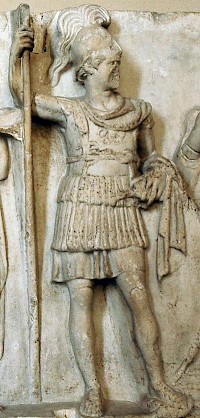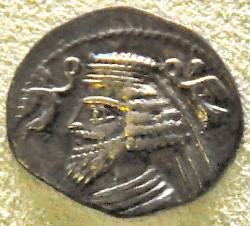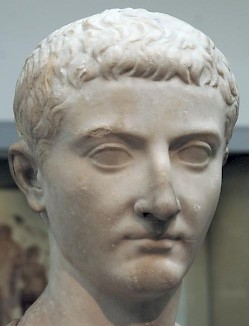Velleius Paterculus
Velleius Paterculus (c. 20 BCE - after 30 CE) Roman officer, senator, and scholar, author of a brief Roman History.

Velleius Paterculus' Roman History - in fact a brief compendium and not a full-scale study of the past - is the most important source for the story of his life and family. The Velleii belonged to the Roman equestrian order (the second level of the Roman aristocracy, after the senators), came from Capua in Campania, and had allied itself politically to the powerful aristocratic clan of the Claudii Nerones.
Paterculus' grandfather Gaius Velleius had been prefect of the military engineers (praefectus fabrum) in the army Pompey the Great, and later in that of Marcus Brutus, the man who had killed Julius Caesar in 44 BCE and tried to restore the Roman republic. At Philippi in Macedonia, in 42, this army was defeated by Mark Antony and Octavian, the new leaders of the Caesarian party. Velleius was probably present, and he now sided with his powerful personal friend Tiberius Claudius Nero. During the next year, Nero got involved in the war waged between Octavian and Nero's friend Lucius Antonius (a brother of Mark Antony). Velleius was unable to help his protector, and may have seen his position in the Campania threatened, so he committed suicide.note
Octavian defeated Lucius Antonius, but was clement towards Claudius Nero. Perhaps he had already fallen in love with the Nero's wife Livia. In 38, she remarried, and Octavian adopted her sons Drusus and Tiberius. The latter was to play a very important role in the life of Velleius Paterculus.
Gaius Velleius' son Velleius, the father of our historian, remained on friendly terms with both the Claudii Drusi and Octavian, who became emperor in 27 and was from then on called Augustus. Velleius is mentioned as commander of a cavalry unit in 3/4 CE, where his son succeeded him..note This is interesting, because the rank of prefect of the cavalry was normally occupied when a man was about twenty-five. So, we can deduce that the historian was born in about 20 BCE, and that his father's career had been delayed. An obvious explanation is that the man who could have promoted him, Tiberius, had retired from public life in these years.
Paterculus earned his spurs during the Thracian wars, which took place in the last years before the beginning of the common era. His commander was Publius Vinicius, the governor of Macedonia and Thrace. The young officer, who had the rank of tribunus angusticlavus, may have met the general's son Marcus, who was about ten years younger. The two men, both from Campania, were certainly friends during the reign of the emperor Tiberius. Because Paterculus claims to have seen the Bosphorus,note it is possible that he served in the Fifth Legion Macedonica, which, of all legions, was stationed closest to the mouth of the river.
In 1 BCE, Paterculus was in the company of Gaius Caesar, a grandson of the emperor Augustus and chosen as his successor. The crown prince, escorted by the famous senators Marcus Lollius and Publius Sulpicius Quirinius, made a tour through the eastern provinces, and later, the historian Paterculus was to give an eye-witness account of what he had seen as a young military officer:
I visited Achaea and Asia and all the eastern provinces, the outlet of the Black Sea and both its coasts, and it is not without feelings of pleasure that I recall the many events, places, peoples, and cities.note

Gaius visited his stepfather Tiberius, who was by now living on Rhodes, and it is possible that Paterculus also met this man, the son of Paterculus' father's protector. Paterculus was certainly present when crown prince Gaius met the new Parthian king Phraataces on an island in the Euphrates (1 CE):
It was my fortunate lot to see this spectacle of the Roman army arrayed on one side, the Parthian on the other [...] - truly a notable and a memorable sight. First the Parthian dined with Gaius upon the Roman bank, and later Gaius supped with the king on the soil of the enemy.note
It is possible that Paterculus was also present when Gaius invaded Armenia, but he does not mention his own presence in his description of this campaign.
What is certain is that Paterculus succeeded his father as cavalry commander in Germania (praefectus equitum), when Tiberius campaigned between the Lower Rhine and Elbe in the autumn of 4 CE. The army wintered at the sources of the Lippe. In the next year, "all Germania was traversed by our armies, and races, hitherto almost unknown, even by name, were conquered".note This was not exaggerated: no Roman army had ever marched along the Elbe for such a distance.
In 6, Velleius Paterculus occupied the quaestorship, one of the lesser magistracies in Rome, but still an important step on a career. From now on, he belonged to the Senate.
Now that Germania was conquered, Tiberius was to lead at least eight legions (VIII Augusta from Pannonia, XV Apollinaris and XX Valeria Victrix from Illyricum, XXI Rapax from Raetia, XIII Gemina, XIV Gemina and XVI Gallica from Germania Superior and an unknown unit) against king Maroboduus of the Marcomanni in Bohemia; at the same time, I Germanica, V Alaudae, XVII, XVIII and XIX were to move against Bohemia as well, attacking it along the Elbe. It was to be the most grandiose operation that was ever conducted by a Roman army, but a rebellion in Pannonia and Dalmatia obstructed its execution, and the large army was used to suppress it.

The emperor Augustus ordered new levies of auxiliary units (the Cohortes voluntariorum c.R., of which there were at least eighteen), and quaestor Velleius Paterculus brought several of them to Tiberius in Pannonia. He claims that he gave up his right to have a province allotted him, and wanted instead to be sens to Tiberius as staff officer.note
Paterculus preferred a military career and witnessed how Tiberius suppressed the rebellion in Pannonia and Dalmatia. In his account in the Roman History, he mentions many details of this war and commemorates several of his companions. He was also present when Tiberius led retaliatory campaigns in Germania, where the Cherusci had revolted in 9. They had defeated governor Publius Quinctilius Varus in the battle in the Teutoburg Forest (September 9 CE) and had annihilated the legions XVII, XVIII and XIX. In 11, Tiberius thought that the Germanic tribes had been punished sufficiently, and he celebrated a triumph in 12.
It was my lot and that of my brother to participate in this triumph among the men of distinguished rank and those who were decorated with distinguished honors.note
Two years later, in 14, Tiberius succeeded Augustus as emperor, and Paterculus' career benefited. In 15, he was praetor, together with his brother Magius Celer Velleianus. After this, Paterculus disappears from our sources. He may have been governor of a province, may have been prefect (e.g., prefect of the military treasury), or he may have commanded one of the legions. The latter is the most likely, because an inscription from El Arrouch (Algeria) survives with the following text:
|
||
|
|
The problem is that we do not know Paterculus' first name. The Christian author Priscilian, who is not really the best-informed of all ancient sources, says that Velleius' first name was Marcus, not Gaius. Perhaps this is not conclusive, because we know that the grandfather of our Velleius was called Gaius. So we are perhaps allowed to accept the idea that Paterculus commanded, as governor of Africa, the Third Augustan Legion.
Although this interpretation is very attractive, it is not without problems, because this legion usually was not commanded by a legatus Augusti, but by a provincial governor who had already occupied the consulship. And we have no indications that Paterculus ever was consul (we may assume that he would have mentioned the pinnacle of his career in his Roman History). On the other hand, all our problems are solved when we take into account that the region was unquiet. Tiberius may simply have appointed a military man he could rely upon in the struggle against Tacfarinas.
Except for this possible command of a legion, we know only one thing about the second half of Paterculus' career: in 30, he published his Roman History, which was dedicated to his fellow-Campanian Marcus Vinicius, the son of Publius Vinicius, Paterculus' first commander.
Nothing is known about the circumstances of Paterculus' death. Two of his sons or grandsons were consuls in 60 and 61.